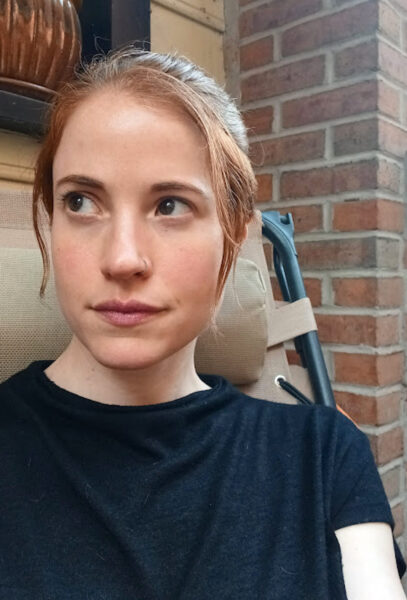I’d love to know where this comes from, because it reads so true. You’ve either been in war or cared for someone who has. Where did you get this character with these memories?
My sister joined the U.S. Marines out of high school, back in 2003. She served for eight years, then transitioned into defense contracting. She and I could not be more different—our personalities, our politics, our life trajectories. She’s a total badass. She can’t tell me much about her military experience, but I’ve always been fascinated with the details she has shared. I keep telling her she should write a memoir, and she keeps telling my nothing interesting happened, which from my perspective couldn’t be further from the truth. I’m also kind of fascinated with unpacking the psychology of people who make that life choice. This story, in particular, was sort of driven by reflecting on the feeling that we had so many shared experiences as kids, but those feel so elusive and hazy, and far away, considering how much things have changed, and how drastically our experiences have different since childhood.
I was with you immediately with the orange soda. I thought specifically of that McDonald’s orange soda, which we always called “orange” or “orange drink.” It’s an evocative recollection. Can you name five vivid smells, flavors, or sights from your childhood? Heck, throw in a sound or a touch, if you’re feeling reckless.
Oof, tough question for some reason. Let’s go with: lilac, moth balls, basil, pine needles, and that sickly sweet country apple body splash from The Body Shop at the mall.
You could always be writing about unicorns instead. How important is it for writers to engage with topics like war? (And why, if you could elaborate.)
It’s important to the extent that it interests the writer! Beyond that, despite the fact that many of us know someone who served, there seems to be a military-civilian gap in art and literature. It can be easy to dismiss people who have different perceived leanings than us. I know only a handful of contemporary literary writers exploring the psychological territory of people who have served. When personal stories within certain groups aren’t told, I think we risk perpetuating flat conceptions, rather than understanding the nuances and complexities of individuals. In my case, I’m really interested in female military experience, which I am on the periphery of. This certainly has not been represented, or even considered much at all in literature. There’s a lot to unpack there. But I’m cool with a good unicorn story, too! Someone should write the Great American Unicorns at War story.
Does this fit into a bigger project for you? Could you describe what it is you’re working on now?
This is definitely a subject matter I keep coming back to. I wouldn’t be surprised if I gleaned it for a bigger project, one day. Right now, I’m working on stretching my short story muscles in a few different directions. I’m a brand new PhD student in a program for writers, after six years of teaching high school. All of a sudden, I’m able to devote more attention to writing again, which feels wonderful.
I see you’re also a visual artist. How is that art like and unlike your writing in terms of subject matter, imagery, or any other factor?
Both are celebrations of love, and acts of love. I tend to paint pictures of people in my life who I love, in scenes I remember fondly. Writing, too, is a way for me to feel closer to people and experience, real or imagined. In terms of differences, my painting interests usually fall under stylized realism, while I have a bit more of a surrealist/ fabulist/experimental impulse with writing. If I were to try to explain that, I’d say it’s because my writing is often an attempt at exploring emotions and paradigms that feel personal, or uncanny—difficult to capture through realism, sometimes. With painting, I just get giddy about capturing light and color and shape.
For some reason I’m more inherently patient when painting. I am more okay with how slow it takes to finish. With writing, more often I can be quick to doubt a project will work. The long game seems harder. I think it has to do with the visual nature of painting. You see the progress right in front of your eyes, every time. The mistakes, to me, feel more recognizable, as do the fixes. Even though I write way more than I paint, I’m a visual person at heart, so that really tickles and motivates me.


